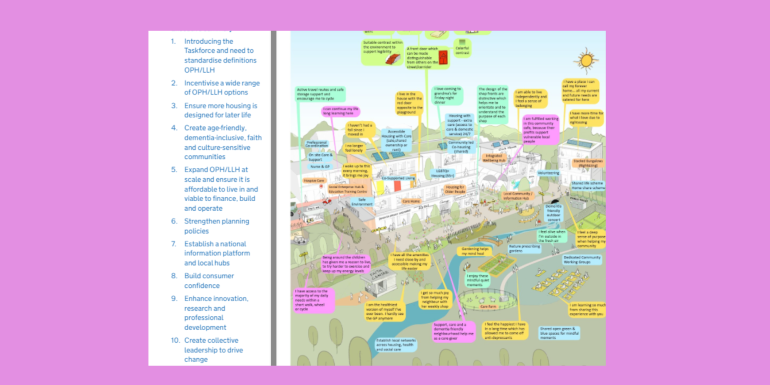UK needs a world class system of housing with care for older people
- Calls for parties to commit to supporting the growth of the Retirement Community sector in their manifestos
For too long - housing, health and social care policy in the UK has failed to join up the dots and facilitate the transformational growth we need to deliver housing, support and care options to hundreds of thousands of older people in the UK.
This needs to change, and ARCO is calling on all UK political parties to sign up to make the following manifesto commitment:
The United Kingdom must set itself the ambition to be a global leader in innovative solutions that address the housing and care needs of our ageing population. This should include:
An ambition to provide an additional 175,000 older people with access to next generation Retirement Communities by 2030.
- Establishing a cross Government task force to review the regulatory obstacles standing in the way of accelerated growth in the sector.
- A commitment to empowering and protecting older people in their choices and decisions concerning their housing and care, including clarity over any fees and charges they may face – and over what they can expect from their provider.
We are committed to working with older people, consumer champions and the Retirement Community sector to achieve these goals
Michael Voges, Executive Director of ARCO said:
“This election is an opportunity for all parties to make a clear statement of their ambitions to grow a world class housing with care system for older people in the UK.
“Currently the UK lags well behind comparable countries in its provision of housing with care. Changing this will unlock billions of pounds of savings for the NHS and social care, free up hundreds of thousands of houses, attract tens of billions of pounds of investment and improve the lives of hundreds of thousands of older people.
“This is a policy all parties should be able to get behind – showing leadership and taking a long-term view of how we provide for our ageing population.”
ARCO and its members have also contacted hundreds of Parliamentary candidates from the main political parties, asking them to sign up to a similar pledge for candidates, with a view to continuing and expanding the work we have been doing with ARCO’s existing cross-party group of Parliamentary supporters (see listing here).
ARCO believes that a Retirement Community task force – if formed – needs to address the following urgent issues that are preventing accelerated growth:
- Providing a sector-specific legal and regulatory framework that protects consumers and provides much needed clarity for operators.
- Overcoming barriers in the planning system which slow down (or even prevent) new schemes from being built.
- Providing a clear definition of Retirement Community offering housing with support and care, removing the current existing ambiguity
- Working with the sector to establish more flexible forms of tenure, providing customers a choice beyond the traditional leasehold system
Over the next three years, ARCO’s Board has agreed on a proactive strategy that will see ARCO significantly expand its activity in these areas (our annual report can be found here). We are hopeful that the next UK Government and Parliament – whatever its composition - will be willing to work in partnership with the sector, customers and civil society organisations in creating a housing, health and social care solution that is fit for the 21st century.
ENDS
For Further Information Please Contact
Gareth Lyon, Head of Policy and Communications, at garethlyon@arcouk.org or on 075350 88498
Notes to editors
- About ARCO: ARCO (the Associated Retirement Community Operators) is the trade association for operators of housing-with-care developments for older people. ARCO was founded in 2012, and is now comprised of 27 private and not-for-profit operators of Retirement Communities. ARCO represents approximately 50% of the Retirement Community sector. ARCO sets high standards, and all ARCO members must adhere to the externally assessed ARCO Consumer Code. ARCO does not represent the traditional retirement housing model where there are limited services and no care is available or care homes.
- About Retirement Communities: Retirement Communities typically consist of individual one or two bedroom flats or houses, located in a development with similar properties. Residents have access to a range of services and facilities, which will include optional on-site care, 24-hour staffing, and dining and leisure facilities, and may also include bars, gyms and craft rooms. Retirement Communities are also sometimes referred to as housing-with-care schemes, retirement villages, extra care housing, assisted living, or close care apartments. They sit in between traditional retirement houses (which have less extensive staffing and leisure facilities), and care homes, and can be in urban or suburban locations.
- About Vision 2030: Vision 2030 is ARCO’s vision for 250,000 people to be living in retirement communities by 2030. The vision sets out ten areas of work for the sector in order to achieve this. These are:
- Development of a clear customer proposition
- Effective self-regulation
- Enhanced health and wellbeing
- Intelligent use of technology
- Flexible models of tenure
- Sustainable funding streams
- Sector-specific legislation
- Comprehensive and robust data
- Clarity in the planning system
- A highly trained workforce
For more information on Vision 2030, please contact Gareth Lyon, Head of Policy and Communications, at garethlyon@arcouk.org.
- Benefits of Retirement Communities:
- Meeting the needs of an ageing population: Older people need and want choice in their housing for later life. However, at present housing options for older people are limited. Retirement Communities are an important element of housing choice for older people. Developing the capacity of the Retirement Community sector is vital to ensuring that the UK’s housing market is fit to meet the needs of an ageing population.
- Promoting independence, security and wellbeing: Older people living in Retirement Communities are likely to experience lower levels of loneliness and social isolation. A 2014 study by the International Longevity Centre found that 82% of respondents in Retirement Communities said they hardly or never felt isolated, and only 1% often felt isolated.
- Reducing costs and encouraging more efficient use of resources: Residents in Retirement Communities are able to receive specialist care in their homes if needed, enabling them to return home from hospital earlier. They are also less likely to enter hospital. For example, one way in which Retirement Communities improve health is by preventing falls. Retirement Community properties are designed and built with adaptations to support independence and research shows that those living in these specialist homes are between 1.5 and 2.8 times less likely to have a fall than those living in homes without adaptations. This helps to reduce pressure on NHS services. A recent study found that NHS costs were reduced by 38% for those moving into Retirement Community housing and NHS costs for ‘frail’ residents had reduced by 51.5% after 12 months.
- Responding to the housing shortage: Older people moving to a Retirement Community will typically ‘downsize’, freeing up much needed and under-occupied family sized homes. If all those interested in moving into a retirement property were able to do so, research suggests that approximately 3.29 million properties would be released, including nearly 2 million three-bedroom homes.





